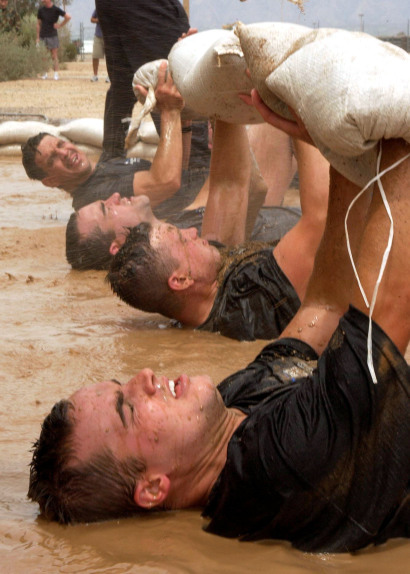The Trouble With the Army
 Monday, July 9, 2007 at 09:25AM
Monday, July 9, 2007 at 09:25AM  I was never in the military, but I have read and observed enough to know that the army reeks of turmoil, oppression and everything unpleasant. It’s just so bad! Even as it surrounds itself in state-of-the-art technology, I marvel that it remains stuck in its primordial past. It inherits more from Genghis Khan, Ivan the Terrible and Napoleon than it does the calmer minds of our enlightened millennium. Sweeping changes need to engulf today’s army. Here are a few beginning points.
I was never in the military, but I have read and observed enough to know that the army reeks of turmoil, oppression and everything unpleasant. It’s just so bad! Even as it surrounds itself in state-of-the-art technology, I marvel that it remains stuck in its primordial past. It inherits more from Genghis Khan, Ivan the Terrible and Napoleon than it does the calmer minds of our enlightened millennium. Sweeping changes need to engulf today’s army. Here are a few beginning points.
First, lose the uniforms. The drab colors, unfashionable styles and stodgy materials foster a demoralizing mindset among the enlistees. Beneath their false sense of bravado and plastic smiles, I am convinced that army personnel suffer from chronic uniform suppressed syndrome (CUSS, a recently diagnosed emotional disorder) caused by uniforms. Soldiers cannot possibly feel at ease and comfortable with themselves when the high command orders them to wear standard issue with suspicious cultic overtones. What gives the effete snobs at the Pentagon the idea that they know what clothes everyone beneath them ought to wear? If one looks close enough, he or she will detect subtle signs of rebellion anyway, i.e. tattoos, facial hair, and loud music. These are more than nameless soldiers. They are human beings who need respect and deference. They must have ways to express their individuality. Either the top brass backs off, or I predict that the entire armed forces will one day go up in smoke.
Second, relax the stressful demands. It is widely known that a number of sincere, eager men and women have been severely traumatized by the cruel and inhumane treatment they received at the hands of drill sergeants. They endured ridicule, screaming, hazing, humiliation and other sadistic acts committed against them simply because they could not run as fast, jump as high, exercise as rigorously or listen as well as their peers. In civilian society, these acts would be considered criminal and the perpetrators would be locked up. Added to these insensitivities, army officers regularly demand that the troops spend long weeks and months on maneuvers, or war games as they call it (exposing the juvenile nature of their ways). This enforced isolation separates the recruits from their local support groups and subjects them to frightful elements of cold, heat, near-starvation, deprivation and both physical and psychological abuse. The majority of those who do manage to successfully finish their torturous regimens reportedly experience nightmares, see flashbacks of an in-your-face instructor shouting epithets at them and insulting their mothers, and spend much of their adult lives seeking to block out harrowing memories. Such barbaric practices can lead to warped personalities. Many former military men and women have been scarred for life by their stint in the army. For example, some insist that their children say “Yes, sir,” and “Yes, ma’am,” take their hats off indoors and conform to other superficial courtesies of yesteryear.
Beyond these points, one could easily construct an entire litany of evils that the army willfully imposes on unsuspecting recruits. Included in the list would be dictating to them how much sleep they need each night; the types and amounts of food they eat; invading their privacy by requiring them to keep their bunks made-up, insisting that their clothes be hung in a particular manner, maintaining a shine on their shoes, how long or short their hair will be and other violations of the human code of behavior. Frankly, it is nobody’s business how a person does any of these things. Also, military leaders attempt to indoctrinate their minions with archaic army values such as patriotism, respect for the U. S. flag and the Constitution. This teaching arrogantly ignores the global society of which we are only a small part, and smacks of old-fashioned nationalism and dangerous fascism. One need only to keep in mind that the right-wing extreme militias and domestic terrorist organizations (of the kind that Timothy McVeigh represented) are all army clones. Actually, the whole business of the army: the ranking, disciplining, promoting and demoting, assigning career paths, shipping overseas and controlling the destinies of individuals for three to four years is an affront against humanity.
One can only imagine how serene and enjoyable the army could be if only each soldier could remain in charge of his or her own life. Gone would be the stifling rules and regulations that restrict the soul. In its place, the enlistee’s life would overflow with joy, love, laughter and positive experiences. Add to that sensitivity training, touching-feeling encounter sessions, culture appreciation and affirmation classes and nature walks. It could end up being so nice that war will simply cease to exist.
Next, we will turn our sights on hide-bound institutions like colleges and universities that suffocate students with silly codes and stuffy standards of so-called excellence. After that, we’ll investigate the church. Yes, it will be a brave new world indeed!







